Nicola Griffith's Blog, page 24
July 15, 2023
Coming out as a scholar
 My IMC ID: battered, bent, unbowed like me
My IMC ID: battered, bent, unbowed like meI’ve just got back from the UK, where I spent 8 days in Leeds, time with family (sisters, nephew, niece, cousins, assorted relatives-by-marriage, and one great-grandnephew) and time with medievalists—specifically, attending IMC 2023 along with 2,500 other scholars of all things Medieval. (For my conference report, see my research blog.) I say ‘other scholars’ with a delighted but tentative grin because—according to my conference badge—that’s what I am  But I’ve never said it out loud.
But I’ve never said it out loud.
Identity is an odd thing. Some labels fit like a glove, some never fit, and some we grow into. For example, I’ve never thought of myself as a woman (I don’t think of myself as a man, either, or nonbinary, or agender, or bigender or any other gender label; I think of myself as Nicola, a person). On the other hand, while lesbian never felt like the right description, the first time I heard the word dyke I thought, Yay that’s me!
Claiming the identity ‘scholar’ feels remarkably similar to coming out a cripple. Although for years I’d associated with other disabled artists and activists, and given featured talks at disability-focused events, I had never publicly claimed the identity. Until one day I did. At which point I thought, Well, duh. And everyone else I knew looked puzzled and waited politely for me to reveal the actual point because, well, Duh!
Though similar, in the sense of my understanding of my identity changing a little bit at a time and then all at once, naming myself Scholar is not quite the same. For one thing, being disabled is not something you earn: through no choice of your own you either are, or aren’t impaired to a disabling degree. The only choice is whether to accept/embrace the identity. Being a scholar is different. I’ve never taken a poll but my guess is medievalists become comfortable calling themselves scholars of the medieval at some point during their doctorate, or perhaps after they receive their PhD. There are a variety of definitions of ‘scholar’ but most commonly it means someone who studies a subject in great detail, usually at a university, and who is (already, or well on their way to becoming) an acknowledged expert in some aspect of that subject. When it comes to calling oneself a scholar of, say, the Early Medieval, it requires 3 or 4 years of a BA (depending on the country), 1 or 2 years of an MA (ditto), then 3 to 7 years of a PhD (this depends on a whole variety of factors). At the minimum we’re talking about 7 years of very hard and focused work; most take longer. Those who get a doctorate in the field usually have baseline levels of certain areas of knowledge, depending on speciality. They have most definitely earned the label ‘scholar’.
Most ‘independent scholars’ are PhDs who don’t have a permanent position at a recognised institution. Again, I haven’t taken a poll but suspect many of those ‘independents’ would much rather have a well-paid and tenured position at a university and that ‘independent’ usually means desperately searching for a way to make a precarious living (often as a badly-paid and extremely under-appreciated adjunct) while also researching in the hope of publishing and staying connected to the discipline they love.
For the last ten years or so, then, on those occasions I’m invited to some sort of scholarly shindig (conference, convention, symposium, seminar, roundtable) in a particular field (English, Medieval History, Disability Studies) I tend not to identify as either an expert or a scholar. This is because I don’t have a BA. I don’t have an MA. And, until 5 years ago, I didn’t have a PhD.
The exception to this rule is Creative Writing. I’ve considered myself an expert writer for 25 years. And from 2017 when I got my doctorate I was fine briefly also thinking of myself as a scholar of the academic discipline—and obviously am utterly independent. But I never felt the urge to put the two together and say, “I’m an Independent Scholar of Creative Writing.” Partly because although I truly am an expert writer, and was, briefly, well-versed in the latest research in some of the more abstruse aspects of the discipline (though haven’t paid such keen attention for 2 or 3 years), I don’t study writing, I don’t research the field, I just do it. Also, although I do occasionally write about it, these essays and articles are not published in peer-reviewed journals.
Yet over the last 9 years I’ve been slowly accreting a sense of being acknowledged by scholars. It began with Medievalists’ fond regard of me as a sort of cute mascot who’s trying so hard to get Conversion Age Britain right that she deserves a pat on the head and the occasional patient answer to an idiot question; then Disability Studies programmes asking me to come give the Named Lecture at their institution; to English and Creative Writing academics inviting the newly-minted Dr Griffith to guest teach the occasional class and stiffen the spines of their MA/MFA students before they venture into the real world; to a new and consciously multi-disciplinary organisation’s conference on the medieval North Atlantic inviting me to give a plenary speech, and genuinely engaging; to sitting on the editorial board of a University press’s new series, and the advisory board of a peer-reviewed journal; to, now, just this month, being the star turn at an event at the biggest academic conference for the humanities in Europe. My event was held in an auditorium the height and hush of a cathedral,1 with winking digital nodes taking the place of candles, where I was introduced, glowingly, by one distinguished Named Professor2, interviewed by two leading scholars in their field, and had my Q&A moderated by one Programme Chair and another Senior Lecturer—with numerous scholars in the audience just beaming in approval, standing to clap at the end, and lining up to get books signed and exchange a word. It felt like an anointing. It said: You are one of us.
So, okay, yes: I’m a Scholar.
Scholar will never be my primary you-are-what-you-do label. That will always be Writer—writing is my true art and expertise. Sometimes, though, I’ll be an Artist-Scholar (or Scholar-Artist?) and, every now and again, Scholar.
1 Though not nearly as awe-inspiring.
2 I was amazed and truly delighted by the warmth and generosity of the introduction—and by the sheer depth of the introducer’s understanding of my career. Knowing how to put into context so many different things takes care, effort, and attention. People at that level don’t go on record with those sorts of things and do that amount of work if they don’t believe it’s true. Between that and a pre-function drink with a Vice Dean who praised the level of knowledge and research in Menewood, I found myself smiling during the introduction, basking, even allowing a moment’s belief in my own publicity (which I usually regard as the blandishments of Satan, to be treated accordingly). Not this time. This time I thought, Damn, I really am impressive!
July 12, 2023
Afternoon Tea—Virtual conversation, Thursday

Tomorrow, Thursday 13 July, I’ll be talking with Penny Batchelor, the co-founder and one of the judges for the Society of Authors’ brand new ADCI Literary Prize. To make sure as many people as possible can join, it’s set for 5:30 pm UK time, 12:30 pm Eastern, and 9:30 am Pacific.
Penny and I will be talking about Spear, writing—its joys and obstacles—and, given this is partially a celebration of the prize, the simultaneously infuriating and exciting state of the disability lit ecosystem. About two-thirds of the time will be me and Penny talking, but the last third is all about answering questions from the audience. You can register here. And when you register there’s an opportunity for you to ask your questions in advance.
I hope you’ll join us. It’s less than an hour, and it’s free!
July 11, 2023
Spear shortlisted for Ursula K. Le Guin Prize for Fiction
I’m just back from the UK and still jet-lagged—expect a blog post on that soon—but today I’m delighted to reveal that Spear is one of nine books shortlisted for the Ursula K. Le Guin Prize for Fiction. It’s a fine and interesting list:
Wolfish, Christiane M. AndrewsArboreality, Rebecca CampbellSpear, Nicola GriffithTen Planets, Yuri Herrera (trans. Lisa Dilllman)The Spear Cuts Through Water, Simon JimenezBrother Alive, Zain KhalidMeet Us by the Roaring Sea, Akil KumarasamyGeometries of Belonging, R.B. LembergDrinking from Graveyard Wells, Yvette Lisa NdlovuI don’t any other prize that might have nominated such an eclectic group of books. There again, I don’t know any other writer like Le Guin, so it seems apt.
This is only the second year of the prize, so I’m not sure how established its rhythms are, but if this year matches last, then one winner and two finalists will be announced on 21st October, Ursula’s birthday. Electric Lit has a juicy news article on the prize, the nominees, and the panel of judges—another rich and varied group, and very fine writers. It also includes an interview with Theo Downes Le Guin, Ursula’s son and literary executor, who founded the $25,000 prize.
On a personal note, I knew Ursula and liked her very much—and loved her work—so this nomination feels special. I am honoured.
June 29, 2023
SPEAR wins the ADCI Literary Prize!

I’m over the moon to announce that Spear has won the UK Society’s of Authors’ inaugural ADCI Literary Prize. I can’t be at the ceremony because I’ll at 30,000 feet over the Irish Sea on my way to spend time with family and then take part in my very first International Medieval Congress in Leeds. Otherwise I would absolutely be there. This award is a big deal for disability representation in literature. I would like to have been able to show the proper honour and gratitude to the event. Plus—a party! And people I haven’t seen for years! And many new friends to meet! But, oh well. It’s still fucking amazing :)
Here’s the press release:
Nicola Griffith wins the inaugural ADCI Literary Prize. Jay Gao and Louise Kennedy are among the 30 other winners at this year’s SoA Awards.
Nicola Griffith has today (29 June) won the inaugural ADCI (Authors with Disabilities and Chronic Illnesses) Literary Prize, for Spear (Tordotcom Publishing), a lyrical, queer reimagining of Arthurian legend, in which ‘those usually airbrushed from history take centre stage’ (ADCI Literary Prize judge Penny Batchelor).
The prize, launched in 2022 to encourage greater positive representation of disability in literature, was announced alongside ten other prizes which make up the annual Society of Authors’ Awards. The SoA Awards is the UK’s biggest literary prize fund, worth over £100,000, this year shared between 30 writers, poets and illustrators.
The ADCI Literary Prize
Sponsored by Arts Council England, ALCS, the Drusilla Harvey Memorial Fund, and the Professional Writing Academy, the ADCI Literary Prize is awarded to a disabled or chronically ill writer, for an outstanding novel containing a disabled or chronically ill character or characters. Judged by Penny Batchelor, Rowan Hisayo Buchanan, Nydia Hebden, Karl Knights, Julia Lund, Nii Ayikwei Parkes, Vikki Patis and Chloe Timms.
ADCI Literary Prize judge Rowan Hisayo Buchanan said:
I was hugely impressed by this work. There is real ambition and fluidity to the writing. It represents a vast amount of research and yet it wears that research lightly. While there was much recognizable to anyone with a glancing knowledge of Arthurian legend, there was also much that felt new. Griffith combines pre-existing myths in inventive and delightful ways. The representation in this story is joyful–acknowledging what might cause a character to be seen as other but finding no shame in it.
I love the fact that the crip representation—and the queer rep, and the Black rep—is called out as joyful. That is always my aim: to not just norm the other but to celebrate and revel in it, to make the queer/crip body a site of delight. We’ve all read too many stories where the women, the queer, crip, Black, poor, trans, nonbinary, old (and on and on) suffer for being who we are. I decided long ago that, nope, not doing that. The single exception in all my published work is So Lucky, because I needed to tell the story of a woman understanding what ableism has done to her, and dismantling and moving past her own, internalised ableism—which is hard (maybe impossible) to do without exploring how that feels (which, spoiler alert, is bad). It was a kind of exorcism.
Spear has none of that, just the joy and occasional ordinariness felt by Peretur (and Llanza and Bedwyr and Hywel) both in their everyday lives and in heightened moments. Spear (like Menewood, and Hild before that) is about expanding and sharpening history, taking the single subject of most heroic historical fiction—the straight, white, nondisabled, noble man—and adding in the people who have always been there and always ignored, the people like us. I’m reforging history from a soft, useless piece of iron to an alloy: light, strong, far more resilient, and, most importantly, much more true.
Thank you to the sponsors of the award, Arts Council England, ALCS, the Drusilla Harvey Memorial Fund, and the Professional Writing Academy; to the judges, Penny Batchelor, Rowan Hisayo Buchanan, Nydia Hebden, Karl Knights, Julia Lund, Nii Ayikwei Parkes, Vikki Patis and Chloe Timms; and to author Penny Batchelor and publisher Clare Christian who alongside the Society of Authors, founded this prize. I’m thrilled beyond words that my Little Book That Could has been read and understood and honoured in this way.
I wish I could have been there—but I will be doing a Society of Authors event with Penny Batchelor, livestreamed 13 July at 17:30 – 18:15 BST/09:30 – 10:15 PT. It’s free, and those who can’t watch it live will be able to watch the video later on SoA’s Vimeo channel.
June 26, 2023
35 Years
How it started.

How it’s going…
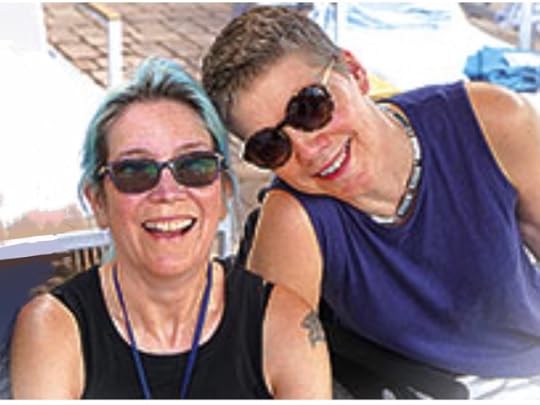
Thirty-five years is enough time to feel pretty confident: I think this is going to work out 
Also, I still like purple and Kelley still likes black. We started with a crap-quality snapshot and 35 years later have another crap-quality snapshot. (In between, of course, Jennifer Durham and Mark Tiedemann have taken some lovely posed photos.) And, y’know, our hair—after coming full circle, me with long hair and Kelley with short hair—has ended up right where we began.
Yep, this is definitely going to work 
June 10, 2023
Spear as the future of Arthurian retellings
I just encountered an astounding (and long—nearly four hours!) exploration by Raf Blutaxt of Arthurian retellings through time. To give you an idea of it’s remarkable breadth and depth, here’s the YouTube listing:
00:00:00 – Intro 00:04:12 The Arthurian Extended Universe And Its Themes 00:21:08 The Different Traditions Of Arthurian Literature 00:45:36 A Quick Look At 1000 Years Of Arthurian Literature 01:36:15 Mark Twain’s “A Connecticut Yankee In King Arthur’s Court” 01:59:57 T. H. White’s “The Once And Future King” 02:21:35 Marion Zimmer Bradley’s “The Mists Of Avalon” 02:47:41 Bernard Cornwell’s “The Warlord Chronicles” 03:07:29 Lavie Tidhar’s “By Force Alone” 03:28:05 Nicola Griffith’s “Spear” 03:45:37 Outro
How does one legend change through the ages? What do different authors do with a well-known story when they retell it? I may not have the exhaustive answer but certainly an exhausting look at the stories around King Arthur all the way back from their origins to last year’s brilliant “Spear” by Nicola Griffith.
Individual book discussions are spoilery but I have put timestamps below so you skip the ones you don’t want to know about.
I can heartily recommend it, not just because Raf loves Spear (though he does; I set the embedded video to start playing on the Spear segment if you want to hear it) but because he is smart and articulate about the various constructions and deconstructions of the legend over the last fifteen hundred years. (Also he likes beer.)
Seriously, if you’re an Arthurian scholar or teacher or student, or as a writer are planning to dip your toes in the Arthurian pond anytime soon, this is a very good place to begin. It would make four or five excellent lectures. You should watch it two or three segments at a time. That’s what I did, starting with Cornwell then Tidhar and ending with Spear—almost exactly an hour—and found myself agreeing with a lot of his analysis. Good stuff.
Cheers!
June 4, 2023
HILD! and MENEWOOD! and SPEAR! At the Leeds International Medieval Congress! In July!
The International Medieval Congress (IMC), held on the campus of the University of Leeds every summer since 1994, is the biggest humanities gathering in Europe. I’ve wanted to go for years—even before I started writing Hild. This year I’m finally getting my wish: I’ll be part of an IMC event on the evening of Wednesday, 5th July.
The room they’ve booked for me is a biggish space, so I want lots of people to come; it’s free and open to the public; and there’ll be a Q&A—which can sometimes get pretty interesting—and afterwards I’ll sign your books. (Some of my books will be for sale at the event, though I’m not sure which ones yet. If you have a favourite, bring it.)
So if you’re a medievalist who will be in or near Leeds for IMC, whether or not we’ve had any kind of conversation or correspondence, I would love (love love love) to see you/have a drink/exchange contact info and/or hear about what you’re working on. (If you have my email address, just email me. If you don’t and want to email me anyway please use the contact form. Or DM me on Twitter or Instagram—please don’t use Facebook; I keep those notifications turned off. Or just drop a comment here.)
If you’re simply interested in and love history, or want to know more about Hild, or have read Hild or Spear and want to know about Menewood, or just want to get your book/s signed, please come to the event. And do come and say hello. I’m very much looking forward to meeting you all!
Wednesday, July 5, 2023 — Leeds, UK — International Medieval Congress
Event: 7:00 PM – 8:00 PM, Esther Simpson Building, Room LG08, University of LeedsEarly Medieval Identities in Hild, Spear, and Menewood: Retelling History and Myth to Include Us All In conversation with Megan Cavell (University of Birmingham) and Jenny Neville (Royal Holloway, University of London). Introduced by Elaine Treharne (Stanford University) Q&A hosted by Joshua Davies (King’s College London) & Matt Hussey (Simon Fraser University, British Columbia) Free and open to the publicThis event was organised by the Institute of English Studies, School of Advanced Study, University of London, with support from the Arts and Humanities Research Council and the IONA association.June 1, 2023
Boars and ravens and gold
Over on Gemæcce, my research blog, I’m having more fun with totems and banners, this time Edwin and Oswald. I consider the meaning of thuuf, sketch different ravens for Oswald’s banner, and mull the possibilities of ‘purple’. Along the way I ponder gastropods and trade routes, shot-silk taffeta and the self-importance dignity of kings…


Totems and banners: Edwin and Oswald
May 29, 2023
Memory of flowers, and flowers to come
Every year we fill planters and baskets on our two decks, and, starting last year, the garden bed in front of our living rom window. Every year I mean to document the progress, step by step. Ever year I forget (or get too busy). I probably will this year, too—but, hey, at least I’m remembering to start with a ‘before’ picture. These photos were all taken in the last three or four days—some in the sunshine, some in the overcast. They are warts-and-all; we haven’t touched anything (beyond cutting the grass) since we did the autumn clean-up last year.
The front garden is the bit I have the least practice with. When we had our house painted a year or two ago, we had to tear our the lovely climbing roses I’d spent years (over a decade, sigh) training to grow over the doorway and porch. The front bed was collapsing, took we tore that out and rebuilt it. I did’t want roses again—they are too vulnerable to PW pests and they are very high maintenance. So I chose a mix of vines to climb the trellises, shrubs, ground-cover perennials, and exuberant annuals. I wanted mostly a red-pink-purple-yellow palette to offset the overwhelming blueness of the house. This is where things stood last year as August turned to September.

Each side trellis was planted with a) a hybrid trumpet creeper: deciduous, so bare and boring all winter, but glorious with rich deep salmon-and-fire colours in summer and b) jasmine: evergreen—so covering all the bare twigs of the creeper), with white blossom in spring. We grow jasmine on the kitchen deck and I’m comfortable with its rhythms and care requirements so I knew that would be fine. The trumpet vine thing, though (sadly I can’t remember its name) was a total shot in the dark.
All last summer the jasmine grew like the beanstalk but the trumpet vine… Well, it just seemed to sit there quietly and enjoy the sun. No growth that I could see and no blossom. So we also planted some blue perennials in front of the whole thing to make things look a bit less sparse This spring, while the jasmine flowered gloriously, the other vine was just a pile of dead twigs. Then suddenly, while we weren’t looking, boom, leaves everywhere. Oddly the jasmine on the left of the house is doing very well; the other vine not so much—but on the right it’s exactly the opposite. Why? I have no idea.
 Lots of jasmine, some blue perennial flower, and not much trumpet vine except a teeny tiny bit right at the top
Lots of jasmine, some blue perennial flower, and not much trumpet vine except a teeny tiny bit right at the topThose dead-looking thing to the lower right are what’s left of the hyacinths that grow every year. I’m not really a fan of those. I love native British bluebells, in the woods, but these messy scraggly hyacinths in front of an already massively blue house, well, if it were up to me I’d rip them out. Kelley likes them, though.
Things look a bit different on the other side.
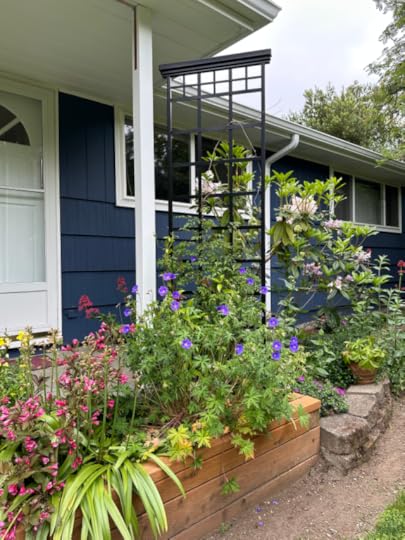 Rhododendron behind the trellis, with pernnial ground cover at its base, then lots of trumpet vine, not much jasmine, and pretty vigorous perennials
Rhododendron behind the trellis, with pernnial ground cover at its base, then lots of trumpet vine, not much jasmine, and pretty vigorous perennials You can see that on this side quite a lot of stuff has survived the winter. Here’s a slightly better picture.

Those blue flowers, and at the back—which thrilled m to see; I wasn’t expecting it—yellow snapdragon! I’m assuming it’s self-sown rather than an actual survival. But it made me smile. The wine-coloured things in front of that—I can’t remember what they are but I wish I could: I love them, and if they can survive without any attention from me I want more of them! Towards the left, almost hidden by those dead hyacinths, you can see the return of a pale-foliaged shrub whose name (again, sigh) I can’t remember. We planted several shrubs, along with transplanted hardy fuchsia, in those front beds, but I’m not seeing much evidence of survival. No doubt I’ll see more when those dead things are pulled. I would love to see some of the salvia we planted come back—but slavia, like fuchsia, can be fickle, and I’m still try to learn the way of the front garden.
One thing in the garden that did not survive, which really surprised me, was the Japanese maple that’s been there nearly 20 years.
 An extinct maple, gone to its maker
An extinct maple, gone to its makerThe bed opposite the window, which you can see as background to the maple, had mixed survival rates. Lots of ground cover survived, and thrived; the roses are unkillable; but our wonderful blue bee bush (Ceanothus) is seriously ailing. It used to be a solid wall of blue, and the bee drone all summer was so loud you could hear it the minute you opened any widow in the house. But now, well, bees still visit (you can hear them in the video below—even over the bass of a delivery car’s bass beat) but I think it’s time to replace it with a new one.
The back fence and back decks are also a mixed (and messy) story.
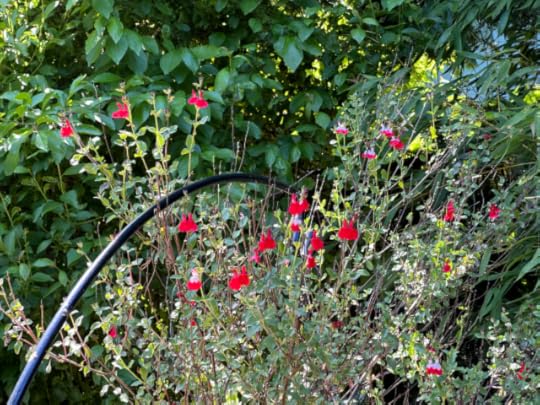 Flaming lips (Salvia) still flaming
Flaming lips (Salvia) still flamingOur hanging basket of salvia is doing brilliantly—flame red blooms drawing the hummingbirds already. The annuals usually planted around the salvia all died, though, so it’s less spectacular than it could be. The other basket of salvia, though, does’t look good. I think we might replace it (transplant it to the back garden and see if it survives—it might). I was surprised by this.Surprised too, that our three different lots of hardy fuchsia—which always survive—this time might not have. That is, they have, sort of: they seem to be sprouting anew from the apparently dead base. But I really want the fuchsias to grow bigger and bigger. If they die—or die back—ever year, I’m never going to get the massive, colour-dripping shrubs I’m after.
Here’s the fuchsia, to the right. Behind it the lilac which just five weeks ago was gorgeous and now looks scabrous—but that always happens—and to the left in the blue pot, the lavender that didn’t do well last year but seems to be surviving okay.
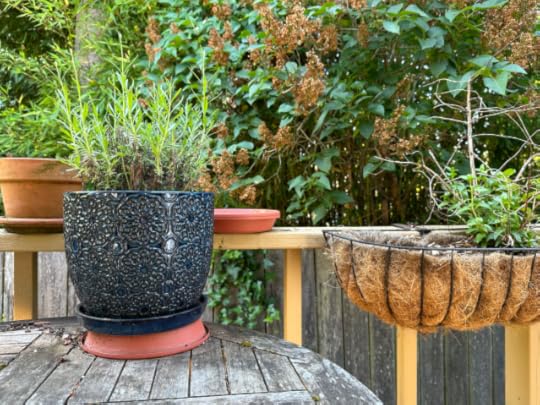
Here’s a wider shot of the flaming lips, taken a few days earlier. You can see that one basket is empty—that’s where we grew the basil, which dies every year in September, and the parsley, which should survive but never does. Just behind that are the herbs that are doing well, including chives, and next to that the main jasmine. Don’t be alarmed by the yellow and brown leaves. Although it’s a perennial, it goes through a partial leaf die-off once or twice a year.
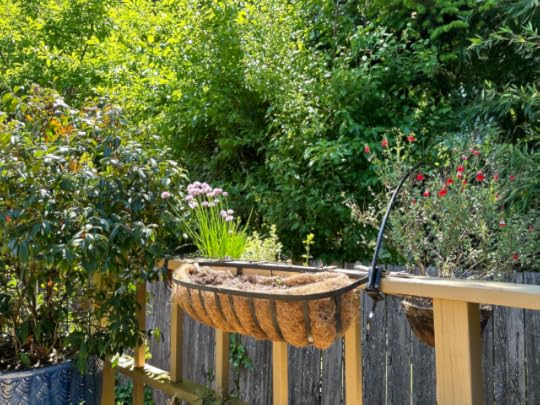
And finally for the kitchen deck here’s a wider shot of the herbs and jasmine. You can just see the sage at the bottom, which is always a doughty survivor, and to its left next to the blue jasmine pot, another of those will-it-or-won’t-it-survive fuchsias. Next to that is the grass we call Charlie’s Hairy Friend—he sits companionably with that plant every summer. Above those are the less-healthy salvia, and then the rosemary, which I can’t tell if it’s doing well or not.

The back deck is also a mixed story. Last year it was gorgeous—absolutely stunning, a riot of lush colour. Just look at last year’s snapdragons, geraniums, marigolds, hissop, salvias, and petunias (and the bay bush hidden beneath it all). If I had to pick my favourite display last year this was it.

Last year at the back we also grew blueberries and strawberries. I had no idea what might survive. It turns out not a lot. The bay bush, which I’d expected. But no fuchsia and no salvia—a disappointment. The glorious surprise was three self-seeded snapdragons.

And they’re the kind with that fabulous blushing salmon colour. They look a bit spindly, though, so I think we’ll buy new ones as well—perhaps plant these in the front bed where we need tall colour.

The strawberries seem to be regrowing, too, and the blueberries, while not exactly thriving, are showing signs of life.
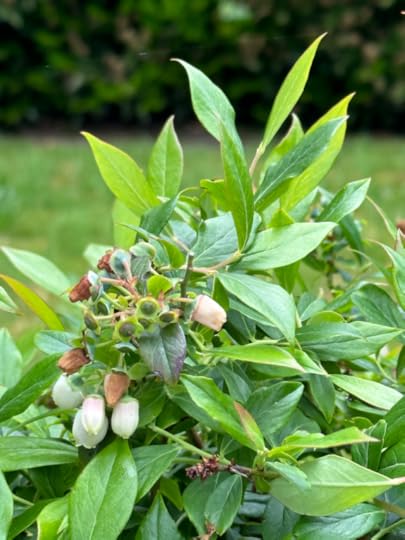
Oh, and I forgot—the trumpet honeysuckle along the back fence is blooming. More bee and hummingbird food.
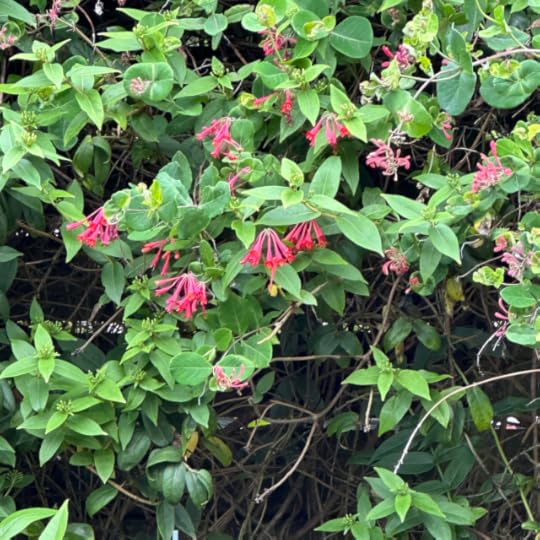
So that’s where things stand here in Seattle on Memorial Day 2023. Sometime in the next couple of weeks we’ll get serious about buying pots and flats and trays of every luscious thing I can find. Then spend some happy evening sipping wine and deciding where to put them. Then we’ll watch them grow…
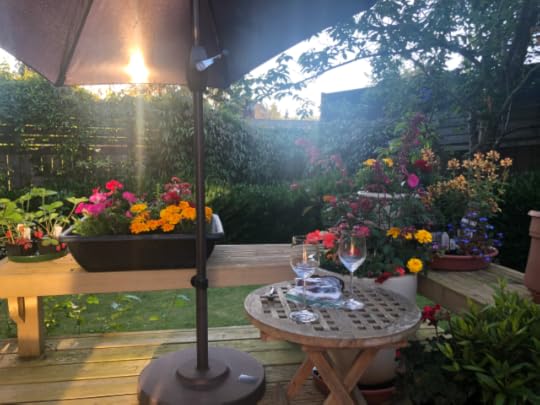
May 24, 2023
Spear on ADCI Literary Prize Shortlist
I’m delighted to announce that Spear has been shortlisted for the UK Society of Authors’ inaugural ADCI (Authors living with Disabilities and Chronic Illnesses) Literary Prize which celebrates positive representation of disability in literature. The prize is open to authors with a disability or chronic illness, for novels including a disabled or chronically ill character or characters.
Spear is in excellent company, alongside Braver by Deborah Jenkins and Fiona-Scott-Barrett’s The Exit-Facility. The winner will be announced along with other SoA honourees at Southwark Cathedral on Friday 29th June. I’m trying to work out if I can be there for the ceremony—I’m not sure yet. If I can be, I will. These awards for literary excellence and crip representation are important.

A year or so ago I wrote a blog post, R/evolution in disability lit is accelerating, about why awards such as the ADCI and Barbellian prizes matter, and what they suggest for the future. Please go read it.
Prizes like these aren’t huge in terms of financial gain: the cash awards are small, and winning doesn’t significantly move the needle in terms of sales—yet. But the same was once true of the Hugo Award—and perhaps even, in its very early days, of the Booker Prize. (Okay, maybe not. When it first began in 1969 the prize was £5,000—about 15% more than the average UK house price; not to be sneezed at. Now of course it nets its winners £50,000 cash, definitely not to be sneezed at—but paling in comparison to the sales bonanza that follows for most winning novelists, and their subsequent advances.
Prizes for CripLit—or DisLit, or Disability Literature, or CIADlit; I don’t care which of these terms you use to talk about CripLit as long as you talk about it—are important because they acknowledge and privilege fiction about crips by crips. They privilege our own truth, lived experience over the regurgitated ableist crap we’ve been force-fed for generations. (I’ve written many pieces about this. See the New York Times or my Washington State Book Award acceptance speech. Or frankly half the essays on my essay page.) If you want to read some thoughts of disabled writers—what we have to face from the publishing industry, what we’re working on—go read the archive of #CripLit chats Alice Wong and I hosted for a while.
Change really has begun. Long may it accelerate! And if you want to help, go buy a CripLit book—go buy one of the ones on the shortlist.
IndieBound | Amazon.com | Bookshop.org | Barnes & Noble | Apple | Amazon.co.uk



